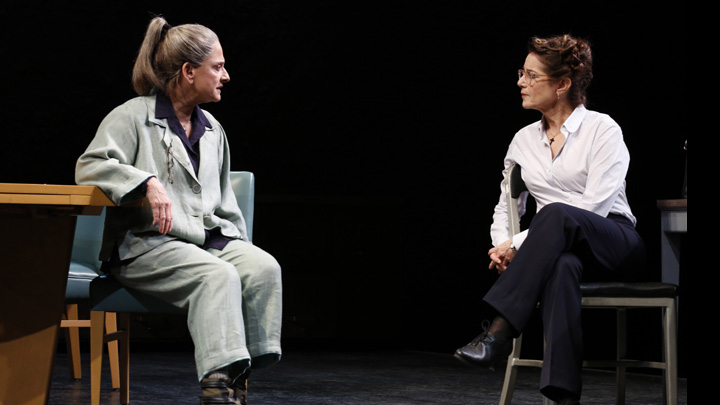Searching for Debra Winger? Easy, look on Broadway

This undated publicity photo provided by Jeffrey Richards Associates shows Patti LuPone, left, and Debra Winger during a performance of the David Mamet play “The Anarchist,” at the John Golden Theatre in New York. AP/Jeffrey Richards Associates, Joan Marcus
NEW YORK – Here is how you woo Debra Winger — the apparently reclusive, seemingly skittish Debra Winger — to Broadway: You don’t play games.
The playwright who managed to do it didn’t first call Winger’s people to find out if she’d say yes if he offered her a role. He just threw his play in an envelope, sent it to her and followed it up with a call.
“I got a script in the mail and a phone call that said ‘Please do my play,'” says the actress. “Right there, you’re 50 yards down the field. You’re like, ‘Wow, I could hang out with this guy. He knows something about human nature.'”
It helps, of course, that the playwright in question is David Mamet. And it helps that the play in question, “The Anarchist,” is a debate about if one can forgive someone’s radical past, an issue close to Winger’s heart.
So it didn’t take long for the star of “An Officer and a Gentleman” to say yes, an act that has bedeviled so many others. The actress rather famously decided to stop working in the 1990s rather than do what she considered mediocre projects, inspiring Rosanna Arquette’s 2003 documentary, “Searching for Debra Winger.”
The Winger who shows up for an interview in an empty Times Square restaurant is hardly the shrinking J.D. Salinger of film — she’s earthy and funny and generous, with a mind both swift and knowing.
Of the seafood bisque she sips hurriedly, she says: “This has so much shellfish, my Jewish grandmother is turning over in her grave.” On her shearling coat: “I want to believe they skinned it, but the animal is still walking around.” This is Winger on the choice of lunch table: “I have no opinion about this, which is really a relief.”
Winger, 57, is making her Broadway debut in Mamet’s play and is both exhilarated and freaked out. But you get the feeling that that’s precisely what she’s been waiting for.
“I think that’s part of my deal — if it doesn’t scare me, why do it? There must be something in there to mine, to plumb, if I have this feeling,” she says. “That’s why in the scary movies you’re all yelling ‘Don’t open the door!’ It’s these things that we’re compelled to do, I think, that holds something for our life.”
It’s actually not the first time Winger and Mamet have worked together. He was an extra in her 1987 movie “Black Widow.” Winger played an FBI agent and while shooting a poker scene in Seattle, director Bob Rafelson asked his buddy Mamet to help out.
“I said, ‘I don’t know how to play poker,'” Winger recalls. “He said, ‘They’ll teach you.’ And in walks Mamet. We spent half of a day together playing poker.”
Fast-forward a quarter of a century, and the new Mamet-Winger collaboration is appropriately a little like a high-stakes poker game: Winger plays a prison warden interrogating an inmate who wants to be released and who is loosely based on former Weather Underground member Judith Clark.
The two women — Winger co-stars with Patti LuPone — circle each other to find truth. Is the ex-revolutionary sincere in her repentance? Can people change? What is justice?
Jeffrey Richards, who has produced several Mamet works, including this season’s revival of “Glengarry Glen Ross,” says Winger, who has been in only a few plays, seems at home.
“I’m struck by how naturally she’s adapted to the stage,” he says. “To do a two-hander is practically one of the most difficult challenges an artist faces and from Day One, she has been spot-on — intense, focused and thoroughly absorbed.”
While the role of a prison warden might be a personal stretch for Winger, who veers left in her politics, the role “feels like a good fit,” although she acknowledges her stiff warden is “not exactly someone that you’d want to take home and cuddle with.”
The irony is that Winger herself has met with and championed the release of Judith Clark, who is serving a 75-years-to-life prison sentence after being convicted as a getaway driver in the 1981 robbery of an armored truck in which a guard and two policemen were killed.
Clark has rejected her past life, apologized for her actions and seemingly been transformed. Even so, although she never held or fired a gun during the crime, Clark has never gotten a chance to get in front of a parole board. “The indeterminate sentence is an un-American thing,” Winger says. “Does that sound American to you?”
In the past 25 years since Winger and Mamet worked together, there’s been a significant shift in the playwright’s world view. Mamet has increasingly come out swinging at the left, attacking President Franklin D. Roosevelt’s New Deal in the 1930s, liberal education and income redistribution, among other targets.
Has that affected Winger and “The Anarchist”?
Not at all, the actress says. “I see his heart and his heart is good,” she says, admitting that she also gets fed up with liberals. “It’s not in his work. His work still understands the balance.”
She also credits Mamet — not always known for his strongly written female parts — with crafting “two lion-hearted women” parts. “It’s something we don’t get very often,” she says. “Maybe that is the problem — that people think they have to write women instead of human being.”
Finding herself onstage hasn’t always been easy, but Winger says it helps having LuPone, a Tony Award-winning singer and actress who has a long history with Mamet. “I’m hoping that if things get really rough, Ms. LuPone will break into song. I know that I always have that.”